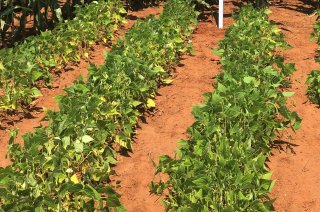
BIO-BELIEF
BIOfortification of common Bean to promote heaLthy dIEt and Food security in a context of climatic variation
Project coordinator:
Prof. Karl Kunert, University of Pretoria, South Africa
Partner countries:
France, Italy, Kenya, South Africa, Brazil
Scientific abstract
Common bean (Phaseolus vulgaris L.) is a staple food in many regions in the world. Bean seeds are a major source of dietary fibers, essential amino acid-rich proteins, some vitamins and often display a high content in essential minerals such as iron, zinc and calcium. However, these minerals are scarcely bioavailable, mainly due to the presence of phytic acid (PA) and phenolic compounds. Besides, about 60% of common beans produced worldwide are grown in regions subjected to water stress, thus after diseases, drought is the second most important factor that contributes to yield reduction.
BIO-BELIEF, a multidisciplinary project which is born from the establishment of a trans-continental consortium between European and African excellences, aims to select new biofortified and drought resilient bean lines, in order to promote a healthy diet in a general frame of food security. The project will release breeding lines with high nutritional values and develop nutritional improved and drought resilient beans suitable to be grown in Europe, Africa and Latin America (last two are regions where bean is a major staple food).
BIO-BELIEF will capitalize previous works carried out by some partners that have selected biofortified lines with reduced level of PA, increased iron content and improved drought resilience. About 20 lines will be tested for seed quality in response to drought treatment in two continents. Meanwhile, the biofortification traits will be introgressed in the drought resilient genetic backgrounds. The innovative technology of Genome Editing (GE) will also be applied to explore candidate genes involved in drought resilience. The biofortified lines will be exploited by preparing bean-based recipes, which will be characterized for their nutritional profile and micronutrient bioavailability. The selected lines will be used for testing by the consumers to validate new biofortified diets for European, African and South American populations.
Partners
The International Center for Tropical Agriculture (CIAT), Nairobi, Kenya
Institute of Agricultural Biology and Biotechnology, National Research Council (CNR), Milan, Italy
Center for CardioVascular and Nutrition Research (C2VN), INSERM 1263, INRAE, Aix Marseille University, Marseille, France
Embrapa Recursos Genéticos e Biotecnologia (Embrapa Genetic), Brasilia, Brazil
Blumen Group SPA, Piacenza, Italy
Council for Agricultural Research and Agricultural Economy Analysis (CREA), Roma, Italy
